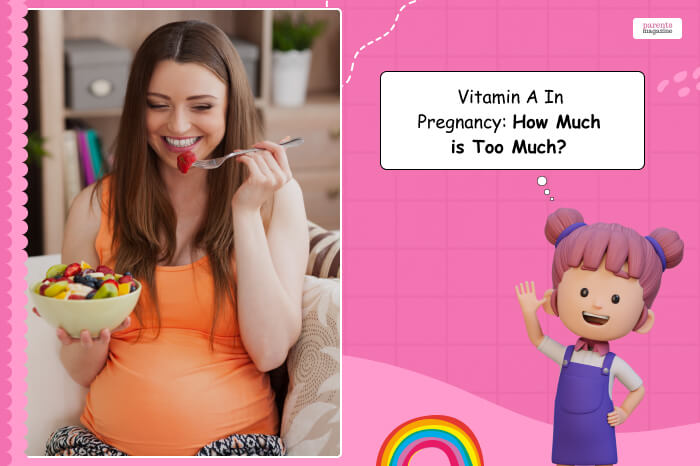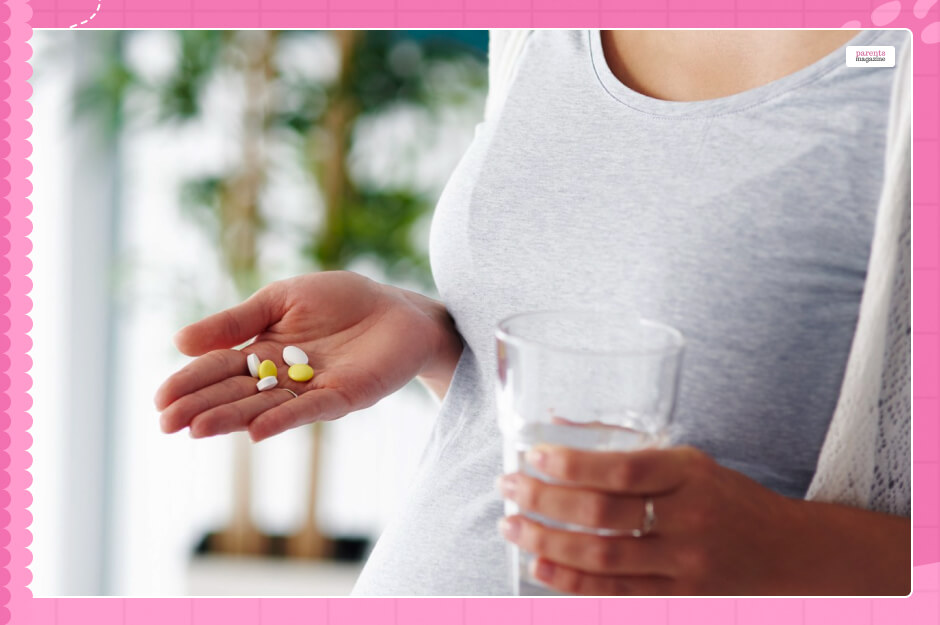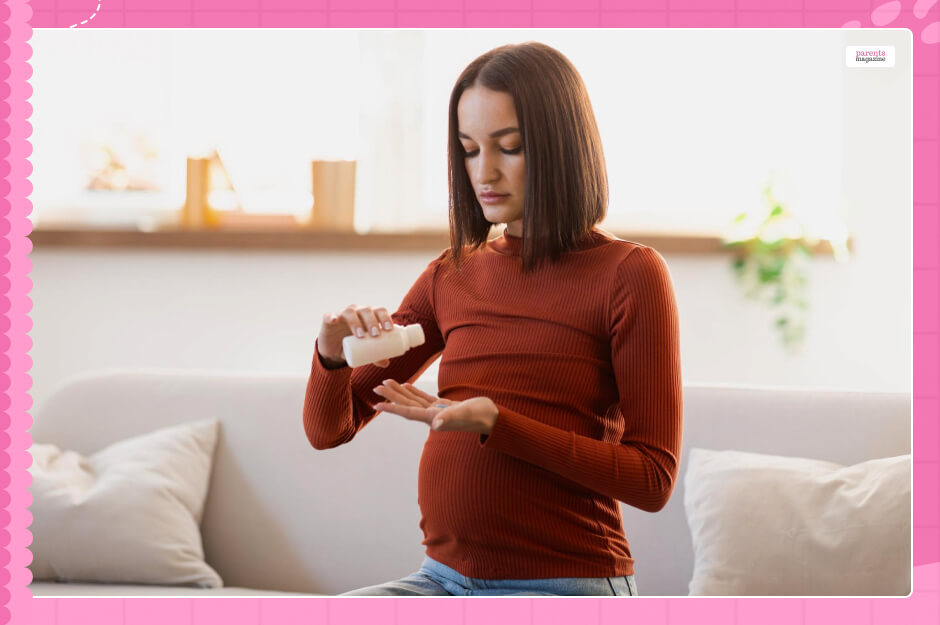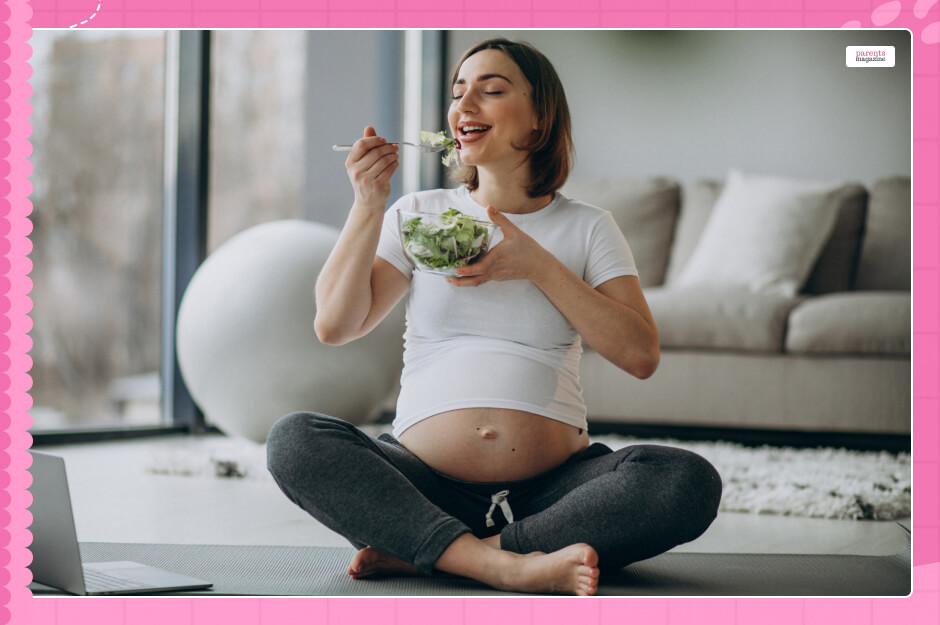
Vitamin A In Pregnancy: How Much is Too Much?
Vitamin A is one of the most important micronutrients for pregnant women and their fetus. It is needed for fetal growth and development and immune function.
Moreover, vitamin A in pregnancy is needed for the development of organs, bones, eyes, the central nervous system, and respiratory and circulatory systems.
Vitamin A is of two types, preformed vitamin A and provitamin A carotenoids. Generally, you get these from food sources and prenatal vitamins and mostly don’t need supplements.
Vitamin A In Pregnancy: Benefits

Vitamin A is a fat-soluble vitamin that is stored in the liver. It is needed for the embryonic growth of the baby, and this includes the eyes, heart, kidneys, lungs, and bones.
Is vitamin A good for pregnancy? Definitely yes. More so for women who are close to their due date because it helps with tissue repair during postpartum.
Moreover, it fights infection, helps maintain normal vision, supports the immune system, and deals with fat metabolism.
As I mentioned earlier Vitamin A is of two kinds. The body uses preformed vitamin A or retinol directly, and it is found in animal products like liver, milk, and eggs.
Beta-carotene or provitamin A carotenoids are found in vegetables and fruits. The body has to convert this type into retinol before use.
How Much Vitamin A Does a Pregnant Woman Need?

Is vitamin A bad for pregnancy? No, but it has to be consumed in the right amount. There are risks of excess or less consumption associated with this. So, let’s check how much vitamin A a pregnant woman needs.
- Pregnant woman (age: 18 and under): 750 mcg RAE/day
- Pregnant woman (age: 19 and above): 770 mcg RAE/day
- Breastfeeding woman (age: 18 and under): 1,200 mcg RAE/day
- Breastfeeding woman (age: 19 and above): 1,300 mcg RAE/day
RAE is retinol activity equivalent, which is the standard of measurement for vitamin A. It is based on the potency and source. I mcg of retinol is equivalent to 1 mcg RAE.
However, 24 mcg of alpha-carotene or 12 mcg of beta-carotene is equivalent to 1 mcg RAE.
Risks of Vitamin A Deficiency in Pregnancy

Vitamin A deficiency can cause blindness, so you have to make sure that you are getting just enough of the vitamin when you are pregnant.
Vitamin A plays a very important role in pregnancy, as its deficiency can cause birth defects. Moreover, it can affect the development of immune function in the baby after birth, which can lead to illness and infections.
Excess Vitamin A: Can It Cause Problems?

Is vitamin A safe during pregnancy? It is. However, too much vitamin A in pregnancy has some risks as well. You must have heard doctors talk about certain foods you should avoid during pregnancy.
Having too much vitamin A can cause harm to the baby during pregnancy. It can damage their nervous system development.
Pregnant women or someone who is planning a baby are mostly advised to avoid certain foods that have high amounts of vitamin A like liver and liver products.
Recently doctors have stopped recommending vitamin A supplements or other types of food that are rich in vitamin A like fish liver oil or cod liver.
If you plan to take any multivitamin, or prenatal supplement, check the amount of vitamin A it contains. Moreover, consult your doctor before you take anything to ensure safety.
Any woman above the age of 19, whether pregnant or not should not take more than 3,000 mcg RAE if performed vitamin A every day.
Moreover, pregnant women and others who are trying to conceive should stay away from prescription acne drugs like Accutane and other drugs that have retinol including topical tretinoin. These are mostly used for treating skin conditions.
Dietary Sources Rich in Vitamin A

Fruits and vegetables, especially leafy green ones, or the ones that are yellow and orange are rich in beta-carotene. These are the best sources of provitamin A. You also get a good amount of preformed vitamin A from cereals and fortified milk.
The liver from chicken, veal, or beef contains a good amount of preformed vitamin A. It has high vitamin A contents, so much so that during pregnancy you have to limit the consumption.
A 3-ounce beef liver serving has more than eight times the daily recommended amount during pregnancy. It is twice the amount that a person should consume during pregnancy.
Here is a list of food sources that are rich in vitamin A:
- One baked sweet potato in skin: 1,403 mcg RAE
- 4 ounces boiled frozen spinach: 573 mcg RAE
- 4 ounces raw carrots: 459 mcg RAE
- 8 ounces vanilla ice cream: 278 mcg RAE
- 8 ounces skim ricotta cheese: 263 mcg RAE
- 4 ounces cantaloupe: 135 mcg RAE
- One whole mango: 112 mcg RAE
- One large hard-boiled egg: 75 mcg RAE
- 4 ounces boiled broccoli: 60 mcg RAE
Myths & Facts About Vitamin A in Pregnancy

Needless to mention, there asr certain risks of consumption of vitamin A in pregnancy. However, apart from the proven facts, there are various myths about this as well.
| Myths | Facts |
|---|---|
| All forms of vitamin A are harmful during pregnancy. | This is not the case. Vitamin A is necessary during pregnancy. However, excess consumption of vitamin A can cause problems in the mother and the baby. |
| Pregnant women should completely avoid liver. | The liver is a good source of vitamin A. When taken in the right amount, it is beneficial for the mother and the child. |
| Vitamin A deficiency is not concerning in pregnancy. | A deficiency of vitamin A can cause blindness and birth defects in the baby. |
| Supplements should be completely avoided during pregnancy. | Controlled consumption of supplements helps in a lot of deficiency cases. |
Frequently Asked Questions
When discussing this topic, there are certain questions that people ask commonly. Here are some of the questions mentioned.
The easiest way to know if you are getting enough vitamin A during pregnancy is by consulting the doctor. You can have a blood test and find out your serum retinol levels.
You have to focus on the right amount, as an excess amount of vitamin A can also cause problems. Have a balanced diet and eat food rich in beta-carotene. You will get this in food like sweet potatoes, leafy vegetables, and carrots.
Even though liver is rich in vitamin A, eating 1.5 ounces or half a serving once or twice a month is safe for the mother and the baby. However, eating small portions often can be toxic for the baby.
Excess consumption of vitamin A increases the risk of miscarriage. This risk is higher during the first trimester, as too much consumption can interfere with fetal development and cause birth defects. Moreover, it can also cause spontaneous abortions.
Taking prenatal vitamins with vitamin A is not recommended if you are planning a baby, or if you are pregnant.
Beta-carotene works as a precursor to retinol or vitamin A. Both are important for the immune system, vision, and skin.
Keep a Check On Your Consumption
Getting enough vitamin A in pregnancy is important and getting vitamin A from your diet is easy.
So, deficiency of vitamin A is rare, except for some medical conditions. You will understand the deficiency from signs like reduced night vision and a weakened immune system.
Night blindness or inability to see in low light is one of the common symptoms during pregnancy if they have a deficiency in vitamin A. This is known as xerophthalmia and causes dryness and thickening of the cornea.
Already have an account?
Sign In
Create your account
User added successfully. Log in









